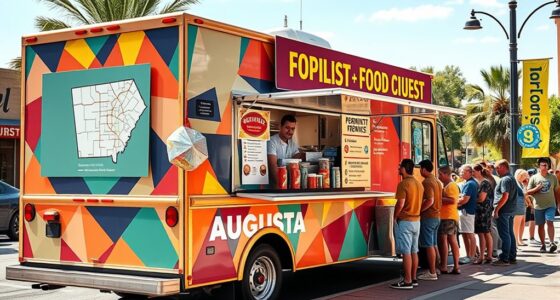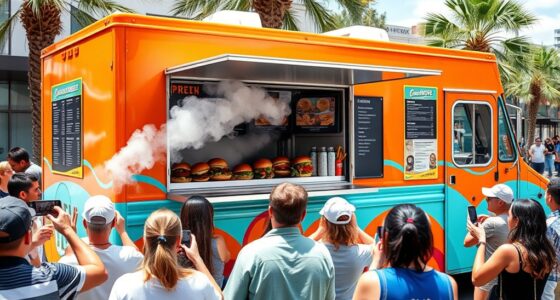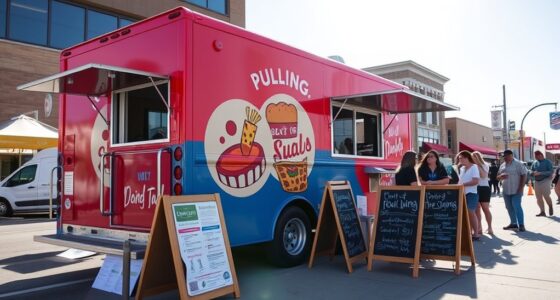To open a food truck in Raleigh, you’ll need permits like a Food Truck Vendor Permit (~$150), health and safety certifications, and possibly property or event-specific permits. Costs vary from around $1,864 up to over $28,000 annually, including licensing, insurance, and staff. Choose locations such as office zones or festivals, develop compliant menus, and utilize marketing through festivals and social media. If you want detailed steps on managing these requirements, keep exploring how to start your food truck business.
Key Takeaways
- Obtain necessary permits including Food Truck Vendor Permit (~$150), property permits, and health permits to operate legally in Raleigh.
- Choose compliant locations such as Office Mixed Use, Downtown Mixed Use, or industrial zones, avoiding residential areas.
- Budget approximately $1,864–$28,000 annually for permits, licensing, equipment, staff, and marketing expenses.
- Develop a menu adhering to Wake County health standards, using inspected commercial kitchens, and incorporate cultural elements for authenticity.
- Promote your food truck through local festivals, social media, cross-promotions, and community engagement to boost visibility and sales.
Navigating Permits and Licensing Requirements in Raleigh
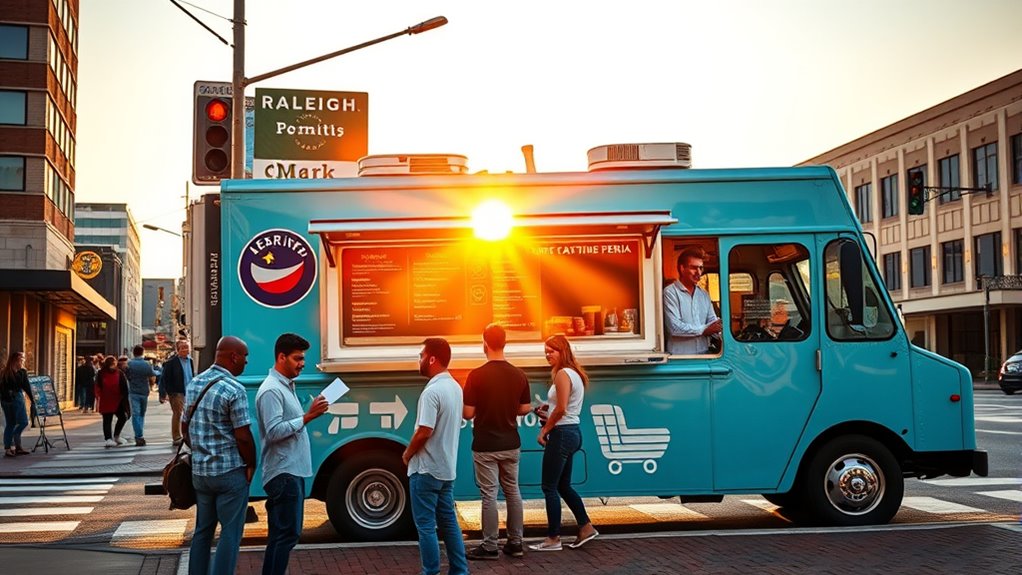
Managing permits and licensing requirements in Raleigh can seem complex, but understanding the key steps makes the process straightforward. First, you’ll need a Food Truck Vendor Permit, costing around $150 annually, which requires proof of vehicle registration and compliance with the Unified Development Ordinance. If you plan to operate on private property, the property owner must obtain a Food Truck Property Owner Permit, including site details and spacing considerations. Additionally, Wake County mandates a Mobile Food Vendor Permit for health and safety, ensuring sanitation standards are met. You must also secure a North Carolina Sales and Use Tax Certificate and possibly an EIN if you hire staff. Applying for the Wake County Food Vending Permit involves submitting specific documentation, such as proof of insurance and an application form. It’s also important to be aware of zoning regulations, which can affect where your food truck is permitted to operate. Finally, operating in designated zones or private property requires proper zoning permits, with all permits displayed while working. Staying organized ensures a smooth licensing process.
Understanding Regulatory and Zoning Standards
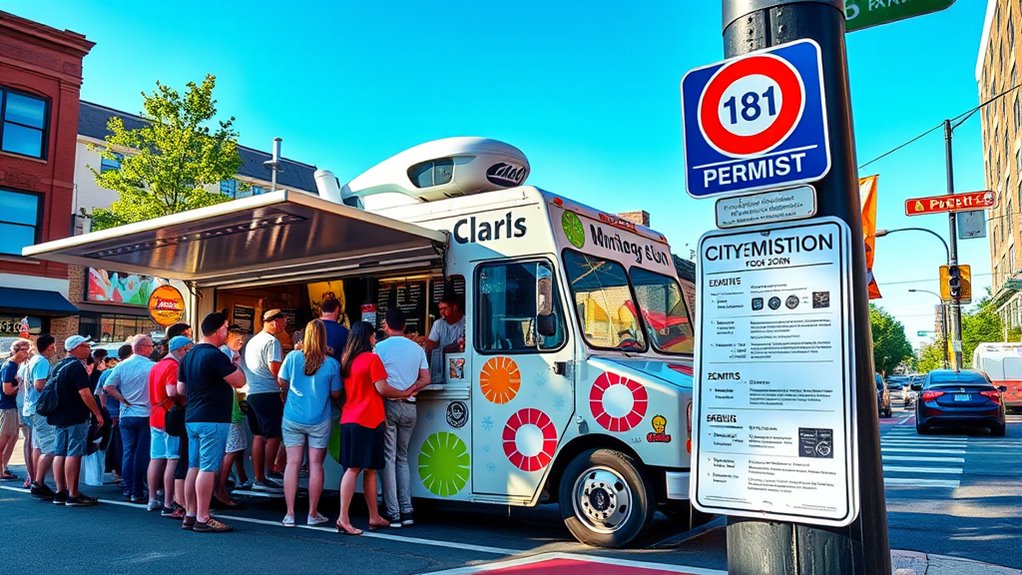
Understanding regulatory and zoning standards is essential for operating your food truck legally and smoothly in Raleigh. You must maintain specific distances from other food vendors, outdoor dining, driveways, sidewalks, utility boxes, building entrances, and fire hydrants. For example, food trucks need to stay at least 100 feet from eating establishments and 15 feet from fire hydrants. Zoning districts like Office Mixed Use, Downtown Mixed Use, and Industrial allow food trucks on lots with active buildings or parking lots, but residential areas do not permit them. You can have up to four trucks on lots larger than one acre, with outdoor seating allowed only on properties of at least two acres. Also, operating within designated public right-of-way areas requires adherence to city-specific locations and rules. Additionally, understanding entertainment and parks hours can be helpful when planning events or promotions to attract visitors.
Estimating Costs and Managing Fees for Your Food Truck
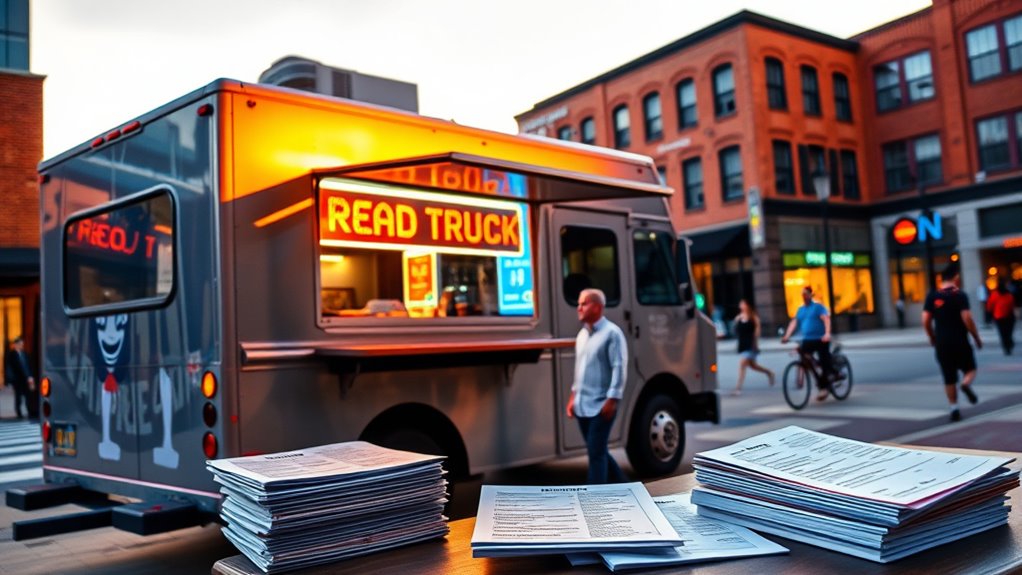
Understanding your permitting expenses and operational fees is key to budgeting effectively for your food truck. These costs can vary widely based on local regulations and your chosen services, so it’s important to plan ahead. Managing these fees smartly helps keep your startup costs in check and makes certain smoother daily operations. Additionally, being aware of seasonal or annual permit renewal requirements can prevent unexpected expenses and ensure continuous compliance.
Permitting Expenses Overview
Getting your food truck approved to operate in Raleigh involves maneuvering a variety of permits and fees, which can seem complex at first. The primary costs include the Food Truck Permit for vendors, roughly $150 to $195, requiring documentation like sales certificates and vehicle registration. Property owner permits cost about $139 to $155, depending on the site. You’ll also need a Wake County Food Vending Permit, part of the overall licensing bundle, and possibly a N.C. Department of Agriculture Food Permit if you sell certain food types. Expect total licensing costs to range from around $1,864 to over $28,000 annually, including permits, licenses, and compliance fees. Additional expenses may include health inspections, street vending, and zoning fees, which vary by location and operation size. Incorporating Vetted – Grobal World resources can help you navigate and optimize your licensing process efficiently.
Operational Fee Management
Managing operational fees for your food truck involves accurately estimating ongoing costs and implementing strategies to control expenses. Fuel and energy costs are essential; budget around $600 monthly for gasoline and propane, and monitor prices regularly. Using fuel-efficient driving habits and proper maintenance can cut costs. For ingredients, expect weekly expenses of $1,000 or more, but bulk purchases and inventory tracking help reduce waste. Staffing costs depend on the number of employees, including wages, taxes, and benefits; using part-time staff offers flexibility. Commissary kitchen fees in Raleigh average $1,000-$1,500 monthly, and parking fees vary by location. Allocating 12-20% of projected revenue for marketing ensures effective promotion, increasing sales and customer loyalty. Monitoring expenses regularly is crucial to keep your food truck profitable, especially when understanding the costs associated with food truck operation in your area.
Choosing Ideal Locations for Food Truck Operations
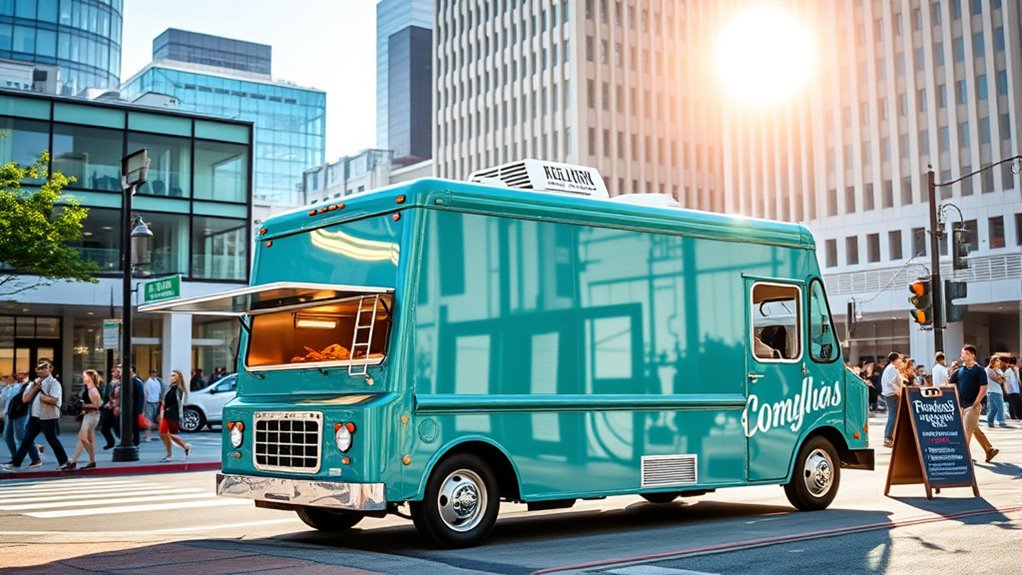
Choosing the right location is essential for the success of your food truck in Raleigh. Focus on areas within allowed zoning districts like Office Mixed Use, Downtown Overlay, or Commercial Mixed Use, where foot traffic is higher. Proximity to large office complexes, colleges, or industrial parks boosts lunchtime sales. Look for private properties with ample parking and space for customers, or areas hosting events and festivals that permit temporary street closures. Always make certain your chosen site complies with health, fire, and safety regulations, including space for covered cooking. Remember, you’ll need a signed zoning permit and detailed site plan approved by the city. Operating on public streets requires special event permits; otherwise, stick to private property with proper approval for a seamless operation. Additionally, assessing the signs of spoilage in lemon juice can help ensure food safety standards are maintained when preparing menu items.
Planning a Menu That Complies With Local Regulations

To guarantee your food truck operates legally and safely in Raleigh, you must develop a menu that complies with local regulations. Your menu items need to meet Wake County Health Department standards, including proper food safety and handling rules. If you plan to cook on the truck, ensure your equipment is under a flame-retardant canopy that meets ANSI standards and obtain any necessary fire permits. Only sell foods prepared in approved commercial kitchens or inspected mobile units—home-cooked or uninspected foods are prohibited. Be mindful of allergen labeling, ingredient disclosure, and menu restrictions on hazardous foods like meats and dairy. Always display valid health inspection certificates and sanitation grades prominently. The availability of diverse cuisines in the region allows for a wide range of menu options to cater to different tastes and dietary needs. Ensuring your menu includes proper food storage practices is essential to maintain safety and comply with health regulations. Following these guidelines helps you stay compliant and ensures safe, legal operation of your Raleigh food truck.
Effective Marketing and Promotion Strategies for Food Trucks

To attract more customers, you should focus on leveraging local events, social media, and business collaborations. Using social media platforms like Facebook can boost visibility and sales, while participating in festivals helps build community buzz. Partnering with local businesses can expand your reach and create mutual marketing opportunities.
Leverage Local Events
Have you considered how local events can boost your food truck’s visibility and sales? Participating in festivals like the Raleigh Food Truck Rodeo or Brier Creek Food Truck Festival exposes you to large, diverse crowds hungry for new flavors. Events such as NC Throwdown or Brewgaloo attract thousands of attendees, offering extensive exposure and brand recognition. Aligning with community and cultural festivals, like the Holly Springs International Food Festival, helps reach targeted audiences and builds goodwill. Operating during peak hours—weekends from 11 am to 7 pm—maximizes foot traffic. Offering exclusive menu items, interactive sampling, or contests at these events creates buzz and encourages social sharing. By consistently engaging at local events, you strengthen your presence and cultivate loyal customers within the Raleigh community. Incorporating cultural artifacts can also add an authentic touch that resonates with festival-goers and enhances your brand identity.
Utilize Social Media Platforms
Harnessing the power of social media platforms can considerably amplify your food truck’s visibility and attract more customers. Focus on Instagram for eye-catching food photos and organic reach, and use Facebook to engage an older audience with events and promotions. TikTok helps leverage viral trends, while Twitter provides real-time updates on your location and menu changes. YouTube is ideal for cooking demos and behind-the-scenes content. Develop a consistent posting schedule with menu highlights, customer stories, and behind-the-scenes moments. Use trendy audio clips and challenges to boost engagement. Encourage customers to post and tag your truck, then feature their content to build authenticity. Analytics tools can help track your performance and guide your strategy. Incorporate targeted advertising to reach specific demographics and expand your customer base. Consider the following platform strategies:
| Platform | Content Focus | Engagement Tips |
|---|---|---|
| Visual food content, stories, reels | Use hashtags, high-quality photos | |
| Events, promotions, customer interactions | Respond promptly, create events | |
| TikTok | Trend-based videos, challenges | Join challenges, use trending sounds |
| Location updates, quick interactions | Post frequent updates, hashtags |
Collaborate With Businesses
Collaborating with local businesses can considerably boost your food truck’s visibility and customer base. Partnering with bars, breweries, coffee shops, or boutiques creates mutual benefits like increased foot traffic and loyal customers. You can bundle food and drinks, host joint events, or offer exclusive menu items to attract new audiences. Catering services to local companies and events diversify your revenue and showcase your menu to different crowds. Distributing menus and promotional materials in nearby offices helps build brand awareness and encourages lunchtime orders. Networking with other food truck owners allows you to share insights, co-host events, and create unique experiences that draw more customers. These collaborations strengthen your presence in Raleigh’s vibrant community and foster long-term growth. Building strategic partnerships can also open doors to new markets and help sustain your business over time. Additionally, utilizing website creation essentials like a professional online presence can further enhance your marketing efforts and attract a broader audience.
Frequently Asked Questions
Can I Operate a Food Truck on Residential Private Property in Raleigh?
You can’t operate a food truck on residential private property in Raleigh unless the zoning specifically allows it. Most residential zones don’t permit commercial food trucks, and Raleigh’s regulations restrict food truck operations near homes. If you want to run a food truck, you’ll need to find a properly zoned commercial property or a location that meets the city’s specific requirements. Check local zoning rules before planning your operation.
Are There Specific Health Department Certifications Required Before Opening?
Did you know that over 90% of food trucks in Raleigh need specific health certifications before opening? You must obtain a Food Safety Manager Certification, like ServSafe®, and confirm at least one certified manager is present at all times. Additionally, all staff handling food need valid Food Handler Cards. These certifications, regulated by the local health department, guarantee your truck meets safety standards and keeps customers safe.
How Do I Handle Parking Permits for Public Right-Of-Way Vending?
You need to handle parking permits by applying for specific permits from the Raleigh city. Make certain your truck is approved for the designated right-of-way locations and complies with safety and parking rules. Submit your application with proof of your business license, tax certificates, and zoning permit. Remember, permits must be renewed annually by July 1st, and you must keep proof of permits on your truck during operations.
What Are the Restrictions on Outdoor Seating for Food Trucks?
Oh, the joys of outdoor seating restrictions! In Raleigh, you can’t just set up wherever you please. If your lot is under two acres, outdoor seating isn’t permitted. For larger spaces, you can have seating if you meet specific size requirements—like two acres or more. Plus, you must stay 100 feet from other seating areas, avoid blocking entrances, and ensure ADA compliance. Rules, regulations, and restrictions keep your outdoor plans in check!
Can I Sell Alcohol From a Food Truck in Raleigh?
You can sell alcohol from your food truck in Raleigh, but you need the right permits. First, get a food truck permit from the city. Then, apply for an NC ABC retail or special occasion license, providing detailed plans and paying applicable fees. Remember, you must follow all laws on hours, locations, and responsible alcohol sales, including displaying your permit. Compliance is key to legally selling alcohol from your truck.
Conclusion
Starting your food truck adventure in Raleigh means charting a course through vibrant city streets, sizzling with potential. With permits secured, costs managed, and a tempting menu in hand, you’ll paint a lively picture of flavors and aromas that draw hungry crowds. As you roll into bustling neighborhoods and share your culinary vision, remember that each step transforms your dream into a thriving, colorful tapestry of community, cuisine, and endless possibilities.


